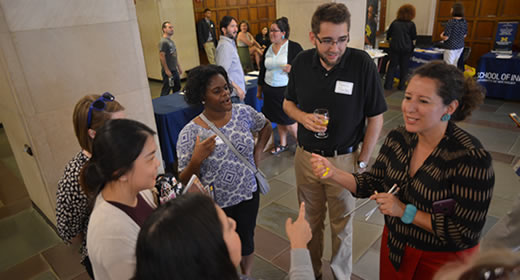
The Ford School and University of Michigan recently hosted the 10th biennial Graduate Horizons conference for American Indian, Alaskan Native, and Native Hawaiian students.
- View the photo album here.
The four-day conference, held July 9 - 12 on the University of Michigan’s Ann Arbor campus, attracted more than 50 native students from dozens of tribes and tribal nations. In small group cohorts, these students explored graduate school programs in business, education, health, law, policy, the sciences, the social sciences, and the arts and humanities.
Run by College Horizons, a non-profit organization that supports higher education among Native American students, the Graduate Horizons program introduces native students to graduate programs and the application and admissions process. During the conference, students connect with faculty mentors in their fields of interest and work on their statements of purpose, personal statements, resumes, and application materials.
Beth Soboleski (MPP '89), associate director of student services at the Ford School, served as a faculty advisor to students with an interest in public policy, public service, and tribal leadership.
The five young women in this group hailed from the Navajo Nation (Arizona); the Wainwright of the Arctic Slope (Alaska); the Tuscarora Nation (New York); the Yurok Tribe (California); and the Kiowa Tribe (Oklahoma). Their interests included environmental policy, economic development, and tribal governance.
Participating faculty, who came from nearly two-dozen schools across the states to participate in the conference, were rewarded with native food, music, dance, and perspectives.
The University of Michigan Law School hosted a dinner and dance in the Law Commons; the Rackham Graduate School hosted another dinner, prepared by a Native American caterer, in Assembly Hall. Speakers at these events included Carmen Lopez, executive director of College Horizons; Dilip Das, U-M’s assistant vice provost for equity, inclusion, and academic affairs; and Alphonse Pitawanakwat, a lecturer in American culture and Anishinaabe language instruction.
For Soboleski, who coordinated the program on behalf of the Ford School and University of Michigan, the conference was inspirational.
"I feel privileged to have had the opportunity to host such a diverse group,” says Soboleski, “and committed to supporting this severely underrepresented population as they work to earn advanced degrees and bring that knowledge back to help their communities navigate complex issues.”
Soboleski also notes that there are dozens of tribes in Michigan and the Upper Peninsula, and she hopes that the University and school can build stronger relationships with them in the years ahead.
For more about the 2016 conference, read:
- Ford School, U-M to host Graduate Horizons program for Native American students
- Graduate Horizons conference provides insight for Native students